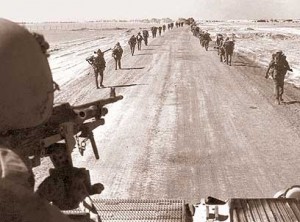Israel Saved by the Soviets in 1973? January 13, 2012
Author: Beach Combing | in : Contemporary , trackbackIn 1948, 1967 and 1973 Israel fought wars that could conceivably have seen the destruction not only of the Israeli state but also of the Jewish community in Palestine. None of these wars came closer to Arab success than the last, the Yom Kippur war. Egypt and Syria (with Iraqi backing) managed to achieve almost complete surprise and broke through the Israeli lines on Suez and almost broke the Israeli lines in the north on the Golan Heights.
What is remarkable looking back is what a close run thing Yom Kippur war was not only in military but also in intelligence terms. The Egyptians and Syrians had taken for granted that news of their attack would get through to Israel’s extraordinary intelligence agencies: either Mossad or AMAN. In fact, they believed that Israel’s cabinet would know of the attack at least five days before it began.
This seems to have been a reasonable assumption. The higher echelons of the Syrian and Egyptian government knew of the decision in September: a month before October 6th. The Commanders of the Egyptian army on Suez knew from 1 October, Egyptian divisional commanders were told on the 3 and battalion commanders on the 5. The Soviet Union was warned on October 3 and there are reasons for thinking that Soviet advisors on the ground must have known (or been able to guess) at least a day or two before that. (Beachcombing remembers earlier discussions of how many people can keep a secret…)
And yet it was only at 6.00 AM on the day of Yom Kippur itself that the Israelis finally decided that war was inevitable and the cabinet was hurriedly convened. Even then the Israelis guessed wrongly in assuming that the attack would come twelve hours later at 6.00 p.m. They had time to mobilise (kind of): but they lost the chance to make pre-emptive strikes on Egyptian and Syrian airfields. Indeed, the Israeli cabinet were still arguing the pros and cons of a pre-emptive air attack at 2.00 pm when their enemies started firing.
Part of the credit for this must go to the Syrians and Egyptians who worked several bluffs. But perhaps more important were the various miscalculations of Israeli intelligence, more dramatic in their way than America’s corresponding failures prior to Pearl Harbour. From late September clues had dripped in but the Israelis had simply failed to put two and two together: the forward deployment of Arab planes, the taking of SAMs from Damascus to the Golan Heights, the issuing of live ammunition to the Egyptian army…
However, it was not until 5 October that Israel’s high command began to get antsy. News that Soviet advisors and their families were being flown out of Syria and Egypt came as a surprise and one that could not be explained away as easily as the use of proper bullets on Sinai. Simultaneously, photographic evidence from Suez – after technical failures and bad weather – showed a massive build up of Egyptian troops.
At this point something strange happened. The Israeli security head held back from pronouncing war until he had confirmation from an important source within Egypt (Ashraf Marwan?) that came (confirming war) on the early morning of Yom Kippur itself. The details given in that report demonstrate that the Israelis had someone high up in Egypt’s government or with high up contacts there, perhaps someone who could only be contacted in an emergency; otherwise the prior silence of this source is strange.
What is amazing looking back is how lucky the Israelis were. If we accept that AMAN approached their special Egyptian source, then the news that really seems to have caused that approach was the flying out of the Soviet advisors from Syria and Egypt in the days previous. The Soviet Union clearly wanted to show its distance from an independent act of war on the part of two of its satellites in the Middle East.
But what if the Soviet Union had not given out this important signal to every CIA and Mossad agent in Cairo and Damascus? Israel would have known nothing till it was attacked at 2.00 pm. True the borders had been reinforced and leave had been cancelled – the Israelis recognised that the temperature was rising – but mobilisation would have started several hours too late. As it was the Israelis only just held the attack on the Golan Heights and the Egyptians broke the Israeli lines on Suez and were still on the Israeli side of the canal when the ceasefire was called. Curiously then it looks as if the Soviet Union reduced a potential Israeli catastrophe to a military and intelligence disaster.
Beachcombing is always looking for hinge moments; moments when history could have turned out differently. drbeachcombing AT yahoo DOT com



